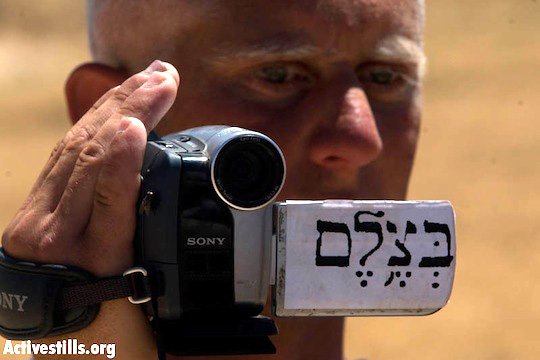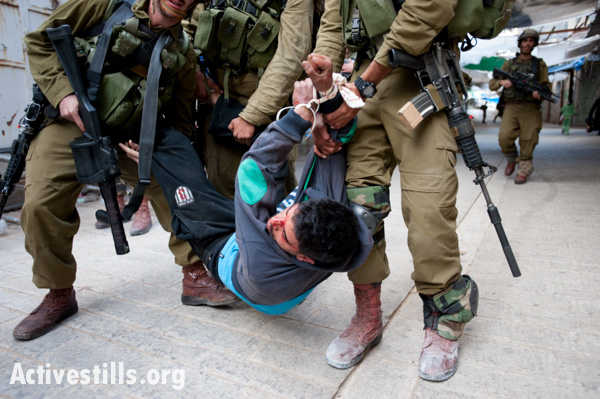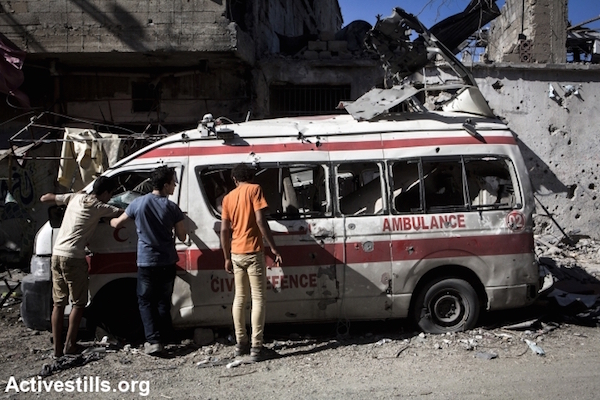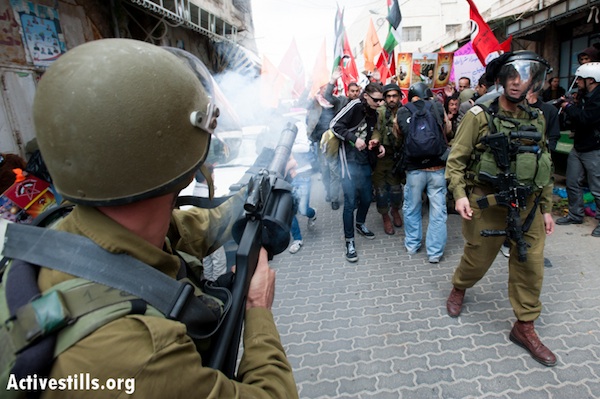The Israeli military justice system acts only to ‘cover up unlawful acts and protect perpetrators,’ B’Tselem says, citing 25 years of experience working with the military. Palestinian rights expert welcomes the move.

Israel’s best known human rights organization, B’Tselem, has lost all faith in the Israeli military justice system and will stop cooperating with it on behalf of Palestinian victims, the organization announced Wednesday.
A quarter century of experience working with the army “has brought us to the realization that there is no longer any point in pursuing justice and defending human rights by working with a system whose real function is measured by its ability to continue to successfully cover up unlawful acts and protect perpetrators,” the organization wrote in an 80-page report that accompanied the announcement.
The report details the exact failings of the military investigative system — read it here.
B’Tselem’s decision is particularly significant because Palestinian victims of violence by Israelis security forces largely rely on Israeli human rights groups to file complaints on their behalf. On a most basic, logistical level, the IDF’s Military Police Investigations Unit (MPIU, sometimes referred to as MPCID) does not have any bases in the West Bank where Palestinians can physically go to file complaints, and the army does not issue them entry permits for the purposes of filing complaints against its own soldiers.
But it is the army’s utter ineffectiveness at investigating its own that is most striking. Out of 739 cases in which B’Tselem demanded that the IDF investigate soldiers killing, injuring, beating or using Palestinians as human shields since the year 2000, only 25 (3 percent) resulted in indictments. At least 70 percent of those cases ended without military investigators taking any action whatsoever, the organization reported, describing the process as riddled by “systemic failures which are neither random, nor case specific.”

Data compiled by Yesh Din, another Israeli human rights group that represents Palestinian victims of crimes by security forces, is even more troubling. According to Yesh Din, in 2014 military prosecutors filed indictments as a result of only 3.5 percent of criminal investigations into offenses committed by soldiers against Palestinians. The indictment rate presented by B’Tselem is relative to all complaints filed, while Yesh Din’s refers only to criminal investigations initiated by the army. (Full disclosure: my wife serves as a legal advisor to Yesh Din, and is the coordinator of its “criminal accountability of Israeli security forces project.”)
None of this, however, is new. Nearly two years ago B’Tselem declared the military law enforcement system “a complete failure,” and announced that it would refuse to assist the IDF in investigating suspected crimes committed by its soldiers during the 2014 Gaza war.
“Based on past experience, we can only regretfully say that Israeli law enforcement authorities are unable and unwilling to investigate allegations of breaches of international humanitarian law committed during fighting in Gaza,” the organization wrote at the time, noting that if Israel were to establish an independent investigative body it would gladly cooperate.
Wednesday’s announcement broadens that move and applies it to all military investigations.

The other major factor behind B’Tselem’s announcement is what the organization describes as the military law enforcement system’s role in undermining the chances of any real accountability of the upper echelons of the military and its political command structure, and creating a sense of legitimacy for and ultimately propping up the occupation itself.
“The semblance of a functioning justice system allows Israeli officials to deny claims made both in Israel and abroad that Israel does not enforce the law on soldiers who harm Palestinians,” the B’Tselem report released Wednesday argued. “These appearances also help grant legitimacy – both in Israel and abroad – to the continuation of the occupation.”
B’Tselem says its move is not meant to shift efforts for holding Israeli security forces accountable into external bodies like the International Criminal Court (ICC). “We don’t think that the current international situation provides other, better avenues for [promoting accountability],” spokesperson Sarit Michaeli told +972. “We’re not going to go to other bodies, but we assume our decision will resonate internationally, and in Palestinian society.”
Which is to say that B’Tselem’s decision may very well affect processes already in place in bodies like the ICC. One of the key factors that ICC Prosecutor Fatou Bensouda must determine when deciding whether to open a full-fledged investigation into war crimes in Palestine is whether Israel is willing and able to investigate and hold its own security forces accountable, and whether it does so in good faith — known as the principle of complementarity. If it does, then the court has no jurisdiction.
But if the ICC determines that Israel is unwilling or incapable of investigating itself, then it may indeed have jurisdiction over war crimes committed by Israeli citizens, ranging from individual soldiers to generals and politicians. Bensouda will certainly take notice of B’Tselem’s message that it has lost so much faith in the Israeli military’s investigative mechanisms that it no longer believes it is worth engaging with.

Shawan Jabarin, director of Palestinian human rights organization Al Haq, congratulated B’Tselem for its decision to disengage from the military justice system, and told +972 he believes B’Tselem’s decision could help the ICC conclude, directly or indirectly, that complementarity does not pose an obstacle to the international prosecution of Israelis. “I think it will help show that there is no will, that [the military investigation system] is not effective, and that it is not an independent mechanism.”
Jabarin, whose organization long ago stopped cooperating with the Israeli military in order to seek justice for Palestinian victims, said he believes it is important for other organizations to follow in B’Tselem’s footsteps. Working with the Israeli Military Advocate General, he said, “doesn’t accomplish anything except [to allow Israeli] officials to create an illusion that there is a democratic, just system in place.”
Yesh Din, along with Adalah, another human rights legal organization based in Israel, expressed criticisms of IDF investigatory mechanisms that are nearly identical to those put forward by B’Tselem. But both organizations told +972 they will continue to file complaints with Israeli authorities, each citing their obligations to seek legal redress on behalf of Palestinian victims.
“[Although] the inherently flawed structures of Israel’s mechanisms make it nearly impossible to obtain criminal investigations, prosecutions, and punishment of perpetrators of serious violations of international law,” explained Nadeem Shehadeh, an attorney in the civil and political rights unit at Adalah, his organization will continue to file legal interventions with Israeli authorities in order to seek individual redress, exhaust all domestic remedies, and to establish and maintain formal documentation for purposes of local and international advocacy.
B’Tselem, however, is not shutting its doors anytime soon. The human rights clearinghouse, best known for distributing video cameras to Palestinians in the West Bank and publishing the video documentation of Israeli crimes and rights violations they capture, will continue carrying out those investigatory and advocacy activities. The organization’s main emphasis, however, will shift away from legal work and move toward the loftier political goal of ending the occupation itself.


